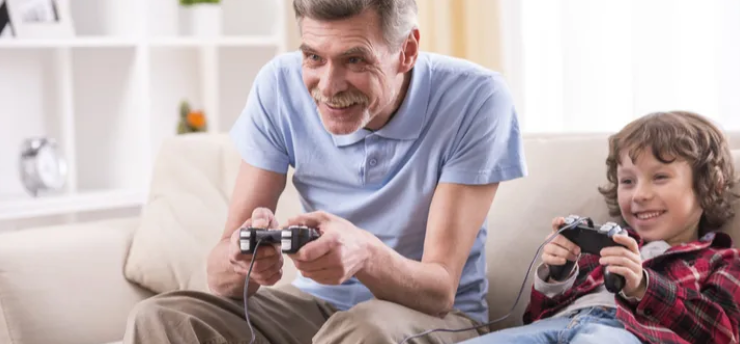Video gaming, sometimes accused of numbing the brains of the young, is helping the brains of the old.
The smart+step program, designed by Neuroscience Research Australia (NeuRA), uses a wireless step mat and a series of interactive computer games to reduce the risk of falls in older people. It was developed for people over the age of 65, using more than 15 years of research from the Falls Balance and Injury Research Centre at NeuRA.
An exercise program based on the system is being trialled in Allity aged care homes in New South Wales and Victoria this month. A broader rollout could benefit up to 3000 residents in New South Wales, Victoria, Queensland, and South Australia early next year.
Dementia is on the rise in Australia. More than 400,000 Australians are living with the condition and it is the second leading cause of death for people aged 85 and over. The number of people living with dementia in Australia is expected to more than double to 900,000 by 2050.
Falls and dementia are among the biggest health threats to older Australians, particularly for those living in residential aged care where one in two live with dementia.
In 2016/17, more than 125,000 Australians aged 65-plus were hospitalised due to a fall. The pandemic has heightened risks of falling for people spending extended periods in isolation.
NeuRA senior research scientist Dr Daina Sturnieks, who designed smart+step, said the program could reduce falls by up to 50 per cent.
“Balance challenging exercises can improve mobility and significantly reduce someone’s risk of having a fall, which is the biggest cause of injury-related death in older Australians,” she said.
“Our trials show people find the games extremely enjoyable. The competitive nature of the games means that we are confident that smart+step participants will happily use the program to obtain the best possible health benefit.”
The smart+step platform features eight games that challenge balance, as well as thinking, skills of attention, inhibition, and visual-spatial awareness. The system is designed to be played at home and connects easily to a TV or computer monitor.
The quicker and more precise their steps are, the more likely users are to progress through the game.
“To make this type of exercise more enjoyable and motivating, we have taken the fun elements of a game and converted them into a program that will improve someone’s balance and thinking skills,” Dr Sturnieks said.
Two early trials of smart+step showed participants improved their balance, step reaction times and central processing ability.
NeuRA explains why the system works: “Each game challenges a different cognitive function, with some requiring more advanced processing ability and quicker reaction times. Players compete with themselves and are encouraged to get the highest score they can before playing another game. While all games train the brain and body, players who complete multiple games will get the most diverse cognitive training.
“Accurate and appropriately timed stepping is crucial for avoiding falls, as is sharp mental processing. By training balance and reaction, as well as attention, working memory and task execution, smart+step helps to prevent people from falling in the real world.”
NeuRA researchers recommend smart+step be used for two hours each week over the course of a year. People can use the program and progress through the games independently with minimal support from clinicians.
Allity chief operating officer Glen Hurley said smart+step helped improve the sociability of residents.
“The program is having an immediate effect on boosting morale and the motivation to be active and healthy,” he said.
In 2017, a study from the Universite de Montreal concluded that people aged between 55 and 75 would be well advised to play “3D platform games like Super Mario 64 to stave off mild cognitive impairment and perhaps even prevent Alzheimer’s disease”.
Participants who played Super Mario 64 for 30 minutes a day, five days a week saw increases in grey matter volume in the hippocampus and cerebellum (parts of the brain). Their short-term memory also improved.
“3D video games engage the hippocampus into creating a cognitive map, or a mental representation, of the virtual environment that the brain is exploring,” said lead author Professor Gregory West.
“Several studies suggest stimulation of the hippocampus increases both functional activity and grey matter within this region.”
If the brain is not learning new things, grey matter atrophies as people age.
“The good news is that we can reverse those effects and increase volume by learning something new, and games like Super Mario 64, which activate the hippocampus, seem to hold some potential in that respect”.
In 2019, a British study collected data from spatial navigation game Sea Hero Quest and concluded that “large-scale digital cognitive testing could hold potential for the early detection of Alzheimer’s disease and help in personalised testing processes to diagnose the illness in individuals showing no clinical symptoms”.
This Christmas grab the consoles off the grandkids!
Are you a big believer on staying active? Do you try to keep both body and brain active?
If you enjoy our content, don’t keep it to yourself. Share our free eNews with your friends and encourage them to sign up.
Related articles:
https://www.yourlifechoices.com.au/news/which-video-games-are-best
https://www.yourlifechoices.com.au/technology/wow-the-grandkids-on-your-video-call
https://www.yourlifechoices.com.au/technology/computers/computer-games-heal-the-world

